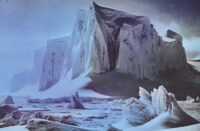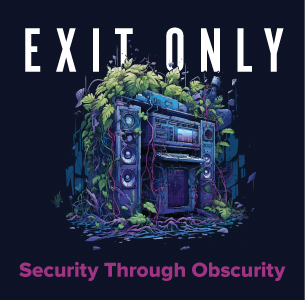
::..:::…..:..::….:::::..:::..:::::::……:::…::.:::….::::..:..:::…::…….::::
Drenching ambience with drone tones and tinny scrapes opens this 42-minute
piece. By combining electronics with field recordings of waves, owls and
other scattered beings Inada develops an all-encompassing wash of tranquil
and haunting sounds. The waves build, the wind streaks through my ears and
the storm ravages and builds until a sudden buzz sputters the ocean into
silence. Nervous, twittering clicks sound as though he’s amped the sounds
of insects eating, preening, etc. As the stirs and whirs carry on, it
becomes an even flow of noise psychology vs. passion play – there is never
quite a sense of chaos here – but that which brews is formidably potent.
Per usual, Staaplaat adorns this edition with delicate handmade earth-orange
paper artwork punctured with holes throughout, something akin to acid rain
perhaps? * * *
::..:::…..:..::….:::::..:::..:::::::……:::…::.:::….::::..:..:::…::…….::::
From their Series I comes one of the newest in a growing collection of tonal
obscurities from the people of Ground Fault. Teaming up for the first time
Australian, Stern and traveling American, Northam, took time out to record
these five untitled tracks just outside of London. These men are what I
call electro-acoustarians, those who research sound, in its most minute
states, develop improvised tactics of dealing with the crunchy blips and
awkward static and raise the bar for younger sound artists breaking into
their own. Both artists here have presented their works in and outside of
gallery/museum constructs to living rooms and other dens of introspection.
What is unique is how well two meet as one to create a harmonic convergence
so to speak. The feedback and coarse noise from found objects and other
matter serve as an uncertain time map of sorts portraying an inherent sense
of perturbed sound. In a nails-to-a-chalkboard approach to bowing the curve of
this atonal shantytown is rank with loose ends and vague meanings, but why
search for one? In essence what hovers here is the unspecific nature of
space, which is quite heady. * * * *
::..:::…..:..::….:::::..:::..:::::::……:::…::.:::….::::..:..:::…::…….::::
Fairy-like, folky harp-like guitar, organ and cymbal open the pretty “Oak
Player” which may or may not pay homage to what was once historically known
in the 20th Century as a turntable. Swedish trio Tape
embarks on their sophomore full-length, Milieu playing like old guard
professionals who have traveled and experienced the Midwest’s dusty plains,
in all its wide-brimmed rhetoric and hillbilly’isms. This would be a country
record if it weren’t. Andreas Berthling, Johan Berthling and Tomas
Hallonsten play everything from harmonium to glockenspiel infused with
site-specific field recordings and electronic tension. They may be the
first-ever trio who truly embody the enormous sound of a full-scale chamber
ensemble (in my ears) without blowing your speakers in half. This has a
very organic, outdoors feel, a “home on the range” especially realized in
the delicate “Crippled Tree” that has an outright butoh sensibility. A new
wave of folk-oriented electronica. * * *
::..:::…..:..::….:::::..:::..:::::::……:::…::.:::….::::..:..:::…::…….::::
Robert Hampson is back to work in a half-hour long hypnotic state of mind.
His usual barren chamber of hollows filled with foggy textures of menacing
drone and wiggly clanging are rightfully fearsome. In what could be defined
as the soundtrack to cellular abnormality, Hampson characterizes his
perceptions of advanced atmosphere as one with faulty wires and digital
delay. The CD interior cover is the exterior of a multilingual imprinted,
recycled grape juice container. The exterior is printed with bright juicy
type graphics on a metallic silver ink – I am not sure what, if anything,
the artwork does for the concepts herein – besides for being a bit odd.
Maybe it’s all in the idea of savoring the flavor – but I digress. These
three tracks are clearly a take-off, journey and magnanimous landing. This
could be the coagulation of DNA-based materials through a florescence
spectrometer, or the true lightness of being. * * * * *
::..:::…..:..::….:::::..:::..:::::::……:::…::.:::….::::..:..:::…::…….::::
Trapist (Martin Brandlmayr, Martin Siewert and Joe Williamson) make up,
essentially, a jazz trio of percussion, synths, guitars, bass and
electronics. Ballroom is their sophomore release after their debut on the esteemed HatHut imprint in 2002. This is jazz for upstarts, it has
a lazy, free appeal. Something along the lines of a scaled down
Splatter Trio or a more temporal Grassy Knoll with shades of Dead Cat
Bounce. Though, this is just the beginning. These gents know how to
wreak havoc in the mix with scattered noise inserts accompanied by risky
drumming and sizzling percussion provided by Brandlmayr. There is an
essential dose of free beat atmosphere that twists salaciously in
improvised awkwardness. Running at about 50 minutes, these five tracks
fill the room with an auspicious sense of confidence. For a moment, on
“Observations Took Place” it sounds as though Siewert is channeling both
John Cage and the Phantom of the Opera simultaneously until the abrupt
end draws fierce punctuation to this melodious cacophony. As for risks,
Trapist seems somewhat fearless for a three-man operation gliding over
its aural canvas like a masterful brush in the form of strings, metal
and digital memorabilia. “The Meaning of Flowers” is the only track
here that seems slightly lackluster, albeit for all its Sigur Ros styled
subtleties, its chops are a bit lazy, hazy. Thrill Jockey will do for
Trapist what Phish did for Medeski, Martin & Wood – bring a built-in
Fan-base that understands the logic behind experimentation and expressive
sound tension to a crowd that may have little exposure to middle-aged
genres like jazz.
::..:::…..:..::….:::::..:::..:::::::……:::…::.:::….::::..:..:::…::…….::::
Brand-new Viennese label Mosz unveils the first recording from the duo
known as Kapital Band 1 (Martin Brandlmayr and Nicholas Bussman). As
the inaugural release for the label (with four more to come in early
’04) this is a new double disc with a twist. Disc one has eleven
studio tracks, while disc two is simply a blank CDR upon which you can
record whatever your hearts content. The move may be a big fat comment
on where the music industry is and how its future may seem disposable –
transferable through digital means – though the converse of a music
community in solidarity, likened to the world of struggling visual
artists (mail art, cassette culture, etc), might be a place where free
idea sharing is learning. This minimalist array of short pieces are
presented in a jazz context through an ambient/electronica filter. This
is a static lovers delight. The packaging is high concept with the
titles forming a sentence and the attention to design details as a
printed and wry comment on the standards of the industry of recording
sciences in general. The music is part erasure, part exclusion, and
covered in a layer or two of white noise. Though the beat is on, its
more a comment than a concert on the atonally challenged “Wait.” Drenched in a platform of mystery Kapital Band 1’s sound stems from
their love of dissonant rhythm and it works so well throughout most of
2CD. Though on tracks like “The New Car” the phantoms that
make for such a primordial ride get a bit clumsy as the whimsy hits the
foreground like a sore thumb on this under 2 minute quickie. The
promise is there, the use of drums and wires even, but the chutzpah is a
bit wreckless and dawdling. It’s the kind of record that will launch
them on attitude and graphic appeal – though the contents, even though I
hate the evil production empire, a slight fine tuning remix. These boys
are running with wild abandon and without supervision, someone get the
stick! That’s the edge, so give me the finger if you must.
::..:::…..:..::….:::::..:::..:::::::……:::…::.:::….::::..:..:::…::…….::::
Experimental noise in a tin film can! These guys have been around for quite some time, recording since the mid 80s. And soundtrack indeed, this sounds like an atom splitting on Mars. I am not really sure if all systems are go – but this surely sends ones senses through a topical disturbance in the tectonic plates of earth, or the planet of choice. Suffice to say after only sheer minutes the object of the action is as clear as crystal. The harmonies are vibrant drones, built on warbling and textural moodiness. Drenched in variable layering techniques the disc takes off on each track as very unique vignettes that tell some larger story. There are washes of static and high pitches squeals, downplayed by the overall industrial rummage. Sounds of deconstruction and glass pops, like shards, and bulldozers warn of change, sinister as it may be. The rumble is more like a fire – perhaps a field recording – than a construction site. And what might be fireworks in the distant background muses in the mix. This is a tough recording built on pure guts and venom. It is likely that we will continue to occasionally hear from these mysterious recluses of the avant-garde’s darker side again in the not so distant future.
::..:::…..:..::….:::::..:::..:::::::……:::…::.:::….::::..:..:::…::…….::::
Frankfurt-based Behrens has had a very busy year, having released outstanding recordings on Portugese Sirr.ecords and others. Here, working with Atlanta Georgia’s small, but sublimely efficient, Edition Records, he has managed to piece together something quite personal. The recording consists of a duo of 3″ discs, clocking in just over 35 minutes. One of the two discs establishes the first available recording of his installation project, The Unknown, which has been shown in Japan and in other international venues. What you hear is a variable pitched sine wave that buzzes and meanders for a bit, creating an atmosphere of tense, almost invasive sense of Orwellian security. Big brother is watching from every axis. His signature hiss-blip-pah is rationalized and delivered with a building, almost dizzying astro-whir. This shapes the sound in circular patterns bringing out an almost fourth dimensional depth to the work. The cover art includes images shot by Behrens from the 90s to the present. These are colorful, visual haikus that aid and abet this true artist’s talent for seeing and hearing connections in the sensory experiences he chooses to share with his audience. The point always seems to be less is more, and inside the less is something subtle, and packed with a passionate appeal establishing an interactive relationship with all ears in what could be called a shared practice in listening. Warning: this limited edition (500) might tingle a bit.
::..:::…..:..::….:::::..:::..:::::::……:::…::.:::….::::..:..:::…::…….::::
After several listens, this disc has garnered some dust over the months as it has sat on my desk. It’s one of those rare, hard to sum up in one note kinda spins. Beautiful would be too trite, ambient magic makes it sound like some Hallmarkian new age fodder, so where do I go from here? Adjectives are almost endless for a release like Telluric Waves and this one is deserving of a bucket-load that might conjure up a million ideas of what it may be about. So, simply put, this is primal, cross genre-bending ambient electronica with a focus on the lighter side of things. Not quite what you might expect from classic micro/ambient imprints like EM:T or 12K, this is a seedling pod of harmonic vision. It’s got the aura of something large and pulsating, but the wherewithal to keep it sparse and well, wave-like. Dare I also say it is a bit dreamy, and it is in this spirit that its resilience as an A-class recording steers clear of its orbit from anything too syrupy sweet. There are no real new ideas here, it’s just a cornerstone for a new take on something tried and true, and the potential is there for future headway. The sound, at times seems to be conforming to sphere-like objects and retreating like diminutive alien craft. Astral projection comes to mind when the static rain starts falling, and the whole universal system here appears to be designed for padded floatation. Sit back, relax and enjoy this mental reconditioning massage.
::..:::…..:..::….:::::..:::..:::::::……:::…::.:::….::::..:..:::…::…….::::
Big bad percussion and a drone as thick as the icing on some Krispy Kremes – Marspiter means business unusual. Is this what Gothicism will become? From what is witnessed here through storm and deep bass only the most barren of cauldron-stirring impossibilities are likely. Through the murk there is a vague anthem playing, almost symphonic, but audible enough to make one wonder about the real hydraulic power behind the mysterious layers here. Part impending drama, part dalliance, part aural earthquake yoga. If Captain Kirk used a compass and plugged his coordinates backwards using floss to save the Bridge you might come close to what Marspiter is getting at. It’s all rather esoteric and somewhat remains informal and rough edged. There are horns and bass drums molding the atmosphere. And all the while this shapes as a soundtrack to some haunted corner of a small, left of center town. This is a new wave of our industrial past, the baby siblings of Hafler Trio or the second coming of Dead Voices on Air. If you like the grey areas of broad, full-bodied dark ambient music this is one of the more essential releases this year, from the arthouse label who are neighbors to Microsoft out of Redmond, Washington. Even more effective on playback.
::..:::…..:..::….:::::..:::..:::::::……:::…::.:::….::::..:..:::…::…….::::
After his incredible performance at last year’s Mutek Festival in Montreal, it is with bated breath that this primarily vinyl-based Detroit resident releases his first full-length disc of mixed contortions. While he was the envy of all as a newcomer amidst veterans like Coil, Senor Coconut and Ritchie Hawtin, Dear seemed to fit like a missing puzzle piece. That may be because, like Germany’s Monolake, he has the ability to have an incredible live presence – so how does it transfer to a pocket-sized compact disc? Punctuated beats flex their muscles with washes of oncoming traffic from freeways and other click-clack on “Fex.” The grooves are voraciously deep and fatter than our recently departed sitcom superstar, Re-Run. But don’t let that confuse you with any case for one hit wonders – as Leave Luck to Heaven is high on the low end as Dear offers dazzling dizzy vocals on “Just Us Now” – succeeding where others have overused similar techniques (Danny Tenaglia, Peter Rauhofer). And all talent aside, when vocals are used in a continuous dance mix it can become parody and repetitive, and this disc survives that often stage DJs get to when working in the medium for too long without a break. Dear has a fresh sound, seemingly influenced by some of the more experimental electronic artists out there – making him an anomaly in his field. There are interesting moments of faux 80s synths and clumsy beats that just make the listen that much more engaging for those of us who have crossed the electronic generation gap. On this recording he has a keen sensibility that covers flavors of jazz, hip-hop and pure techno from an at times comedic perspective. One thing is certain here – he keeps the rhythm up and the knobs spinning. Dear proves to have learned quite a bit from equal measures of Kraftwerk and Sly Stone. The funk is alive and well and pumping through Dear veins.
::..:::…..:..::….:::::..:::..:::::::……:::…::.:::….::::..:..:::…::…….::::
In thirty-three minutes these Japanese composers descend on your eardrums with a futuristic buzz that is both clean and precisely distorted. It’s a living thing, a pulse so smooth and elegant it becomes a bit alarming. The free contortion bends the sound like something rubber, giving foundation and 3D leading into a batch of static, sinewaves and other currents in frequency. This is a surprisingly first-rate combination of two significant talents of the more avant-garde side of electronica and experimental noise and it does take them a bit to warm up, but once they are good and ready, about half way through this short spin, they are going gangbusters. There are some usual silences and peculiarities but the lid stays on this kettle. With Takemura’s penchant for keeping it minimal with an occasional jazz reference or child-like toying around and Yoshihide’s unpredictable clamor, this meeting has tempered both of their styles into something of a summation of edits, a detail of either’s usual drama and subtleties. What develops is something of a permutation of filtered textures, making for a natural hybrid that channels an interesting collaboration.
::..:::…..:..::….:::::..:::..:::::::……:::…::.:::….::::..:..:::…::…….::::
One of today’s most revered turntablists, who uses and defines the intersection of analogue and digital technologies treats his listenership to a world of variant layered tones. On 7, Jeck has remodeled his talent in a way that defines the essence of what has become refreshing in sound today. By offering long, harmonic passages that are both mysterious and somewhat uncharted he has permeated hi-fidelity by using an equivalent of found objects (mature German turntables). His records crackle and bend and fade, though for the most part he uses them with such technique that you may confuse him for using sound samples and field recordings, the traditional sound of the classic DJ is virtually absent and this puts Jeck clearly in a category alone. What is produced in this meticulous production builds more like a crossbreed of sounds you might hear from Organum or John Duncan. Jeck is also one of the few active 50-somethings (like Asmus Tietchens) in a field where most of those performing are a few decades younger and strictly using digital means and apparatus. 7 could be one of the surprise discs of the year in its casual way of presenting what might happen if you pummeled through a living room with a locomotive-sized batch of angry Victrolas leashed by a soft spoken man who surpasses the ferocious humor of it all. With the collision of big band era cartoons and lapping Maui rhythms, the beat is plausible enough for further mixing. There are rasping wheels, troubled tubas and lots of make believe making this one of my favorite spins of 2003.
::..:::…..:..::….:::::..:::..:::::::……:::…::.:::….::::..:..:::…::…….::::
Not your typical micro fare by these two sound stylists. In fact, the combination reminds me of Matmos’ sparely alive contribution to Bjork’s Vespertine. I could just imagine a lilting chant or pagan voice chiming in through these vibrant drone harmonies. Willits’ work on Ireland’s Fallt and Deupree’s own 12K/Line have been intriguingly rhythmical and warm. Deupree’s broad perspective on all that is pulsing in minimalism offers some grounding to this collab, which has an immediate seamlessness about it. Still, as the ticking sounds offer, this may be an experiment in passing batons. Deupree came to prominence in the early 90s after helping found and package the then mostly unknown, but righteously alive electronica set Prototype 909, and after some turns under several monikers (Human Mesh Dance, Arc, etc) and founding his fantastic label, he has since dedicated himself to the further development of many young and upcoming sound artists. His good deeds have enabled him a place to also continually evolve as a sound maker himself, and that leads to solid projects like this one. There is a pace that somehow infers sadness on this untitled recording. This also gives us one of the few opportunities to hear separate live recordings (at Tonic, NYC) by these men. At first Deupree’s piece sounds as if he were warming up to play an assortment of glass with prepared tape loops. As he shapes these 19 minutes a lone beat appears to go forward and back, up and down, with a flattering echo only to vanish. There is a matter-of-fact approach to his live playing here, its almost as though he has ideas to present, many ideas, and they are presented haiku style. Alternately, Willits lets his stride rip with reverse loops and other up-beats. His playful style is like a masterful deconstruction of Mike Oldfield’s Tubular Bells.
::..:::…..:..::….:::::..:::..:::::::……:::…::.:::….::::..:..:::…::…….::::
Frisky beats from the moment the laser hits the five-inch silver saucer. France’s Jonas Bering has stirred up the dusts of his wicked ways to produce a sincerely tech-electro recording that draws most of its tact from moogy 80s syths and clap tracks. It’s a look back with a forward-thinking methodology. The word “scrunch” comes to mind when enjoying the shifting, beat-laden “Nighthawks” – it has a sort of 3D appeal. “Circus” makes me queasy, with warped, assorted junk culture rhythms. And then there are moments in repose on “Mustang 1966”, extracting all the nervous energies from the ear with a coating of spirited trance. Bering does diligence to the blistered world of contemporary electronica by acting out his ambient fantasies out loud. “Sketches for the Next Season” has no gray areas, it is much on the surface, containing a few additional layers of colorful downtempo similar to the tranquil world of Moby’s alter ego as Voodoo Child as heard on the scenic relics “Wissant” and “Ninas Song”. Bering’s sophomore effort is a classic spin.
::..:::…..:..::….:::::..:::..:::::::……:::…::.:::….::::..:..:::…::…….::::
A very mysterious tray card booklet holds several pages of metallic gold
with no text whatsoever. The statement is circuitous and empty. The
music, however, is an electronic fairytale crafted in the mid 70’s by
German electronics pioneer Conrad Schnitzler. The fourteen tracks on
Gold indulge us in momentary austerity, prefaced by teeny jittering
and rambunctious machines. Another clever use of sythesizers and
percussion that sounds primal, not at all dated like some of his contemporaries of the time. The racing, producing, and eventual flight
of these unseen “workers” ticks away with a balanced storybook rhythm
track. Amazing building blocks to what one day would come to be known
as the dawn of pop electronica in the guise of perhaps, Depeche Mode. * * * *
::..:::…..:..::….:::::..:::..:::::::……:::…::.:::….::::..:..:::…::…….::::
Recorded in Italy, Dean Roberts needs no formal introduction as a
premiere atmosphere maker. He employs three Italian musicians in the
process including prepared guitar work by Giusseppe Ielasi and hands
production responsibilities to new composer Valerio Tricoli. The space
is smoky, yet awkward, certainly less edgy and noisy than Roberts former
works. The environment most certainly dictated the overall lazy spirit
here with melancholy raw vocals, piano and even glass harmonica. The
acoustic nature of Be Mine Tonight is simultaneously rootsy and
alienating. Austrian-based New Zealander Roberts has full control of
his instrument while improvising live, making a passionate and radical
harmonic chorus bloom luridly with recessed soul. * * *
::..:::…..:..::….:::::..:::..:::::::……:::…::.:::….::::..:..:::…::…….::::
Esoteric aesthetics dominate this microsound release. Furrowing
electric critters and sabre-like pitches prove that white noise can be
more than a plain old drone and can be used as an element, almost as if
it were the physical manifestation of a paintbrush, directional and goes
wherever you push it. I imagine this being played in a completely pitch
dark room with light emitting diodes pulsing only sparsely at climactic
points in the process. There is a filtered and geometric wisdom to the
thought-provoking dissonance on Ba Kagpja that sustains itself from
the sheer abyss. * * *
::..:::…..:..::….:::::..:::..:::::::……:::…::.:::….::::..:..:::…::…….::::
Links ::
::..:::…..:..::….:::::..:::..:::::::……:::…::.:::….::::..:..:::…::…….::::
Read more Microview’s ::






















